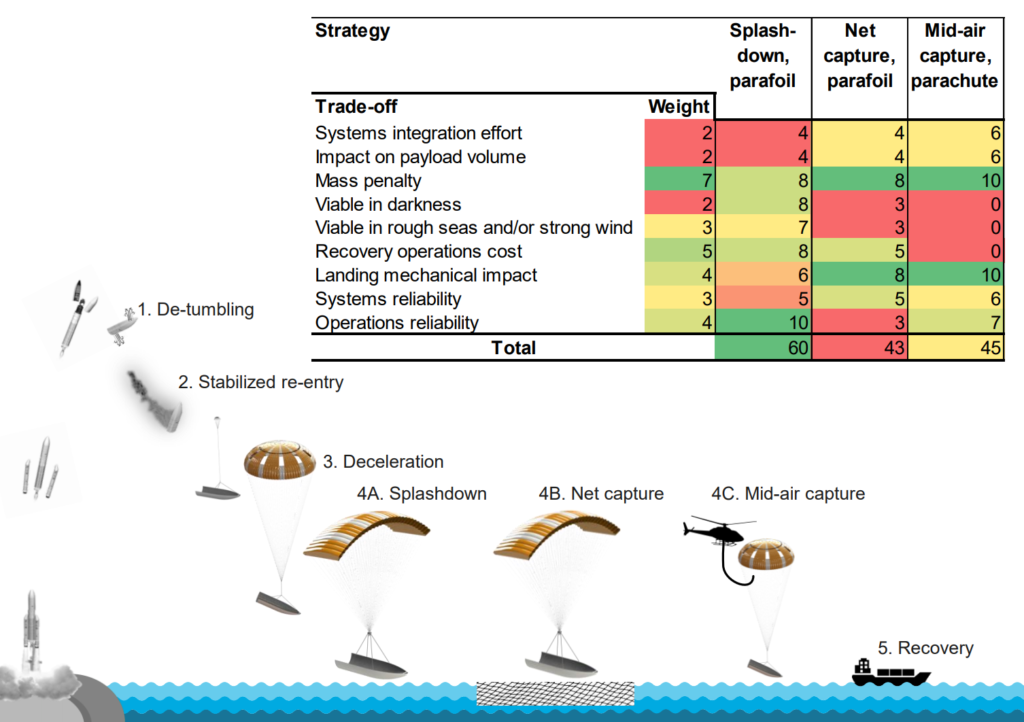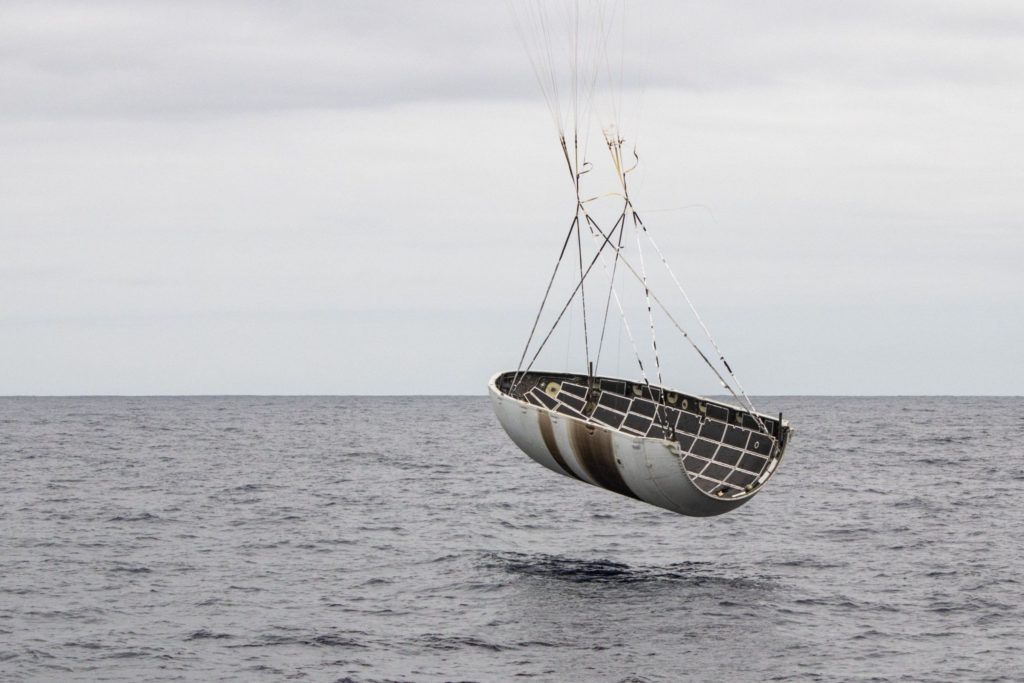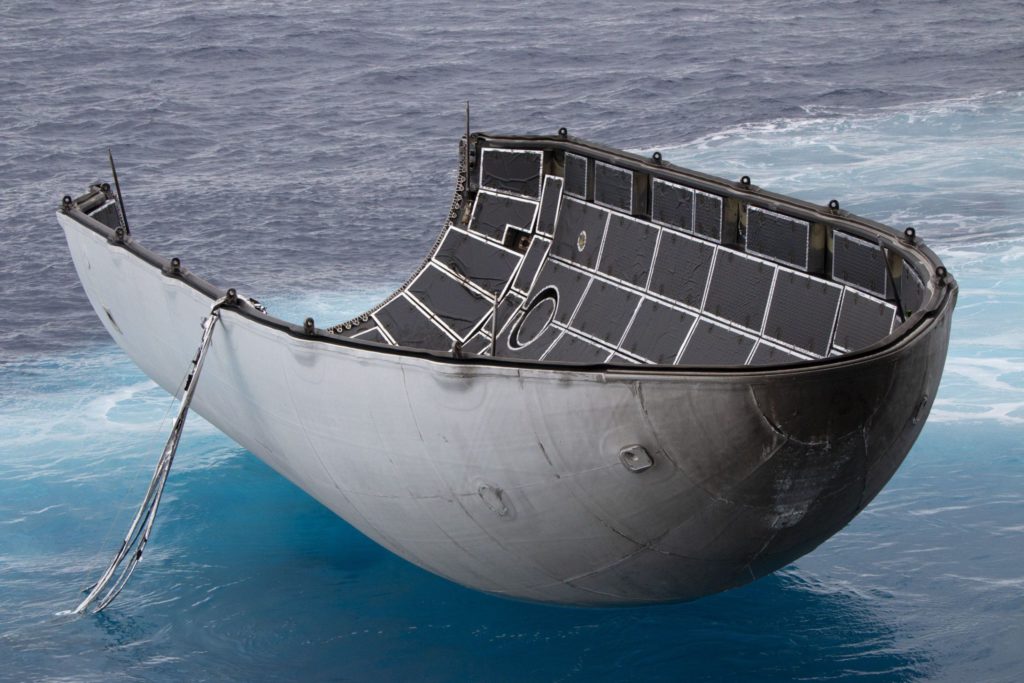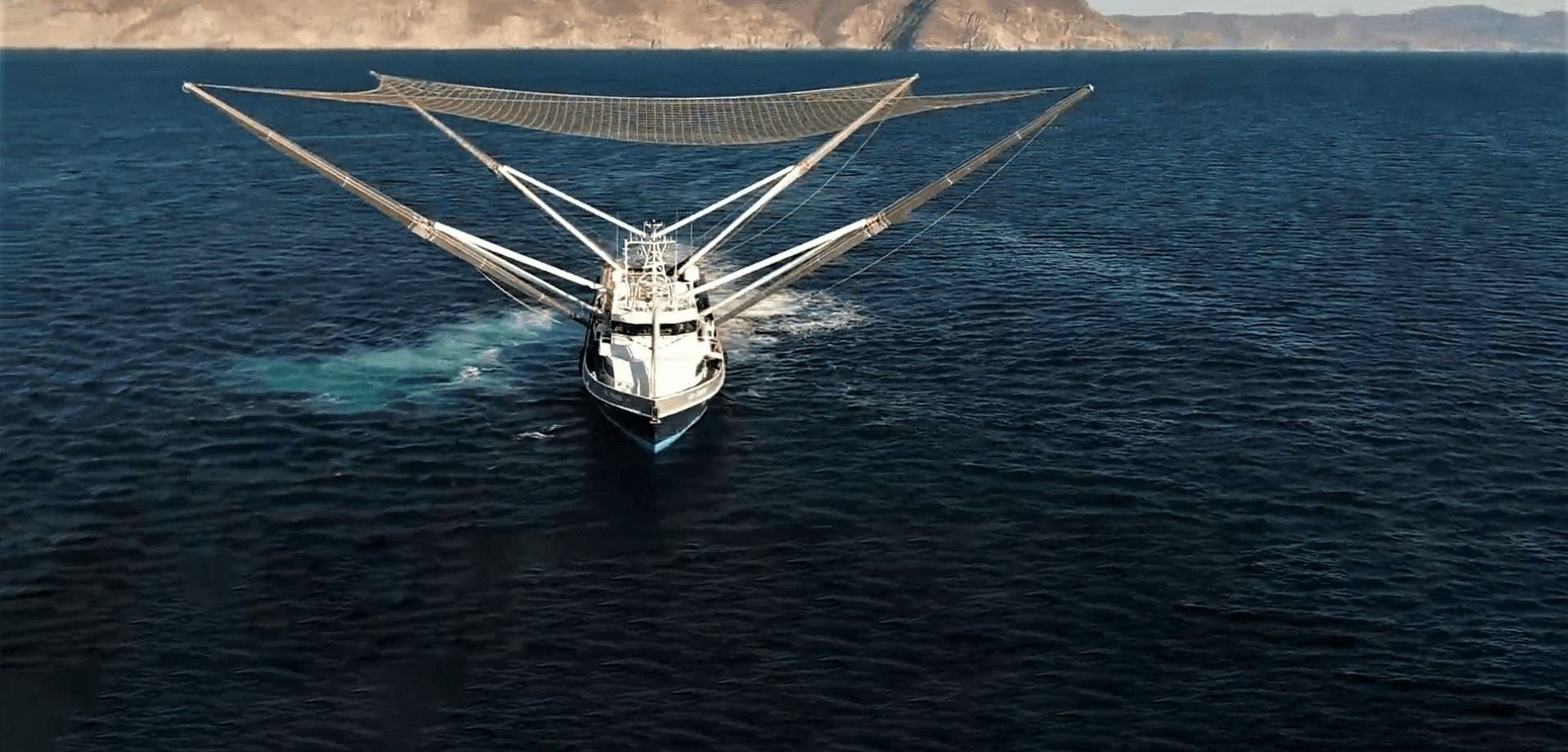
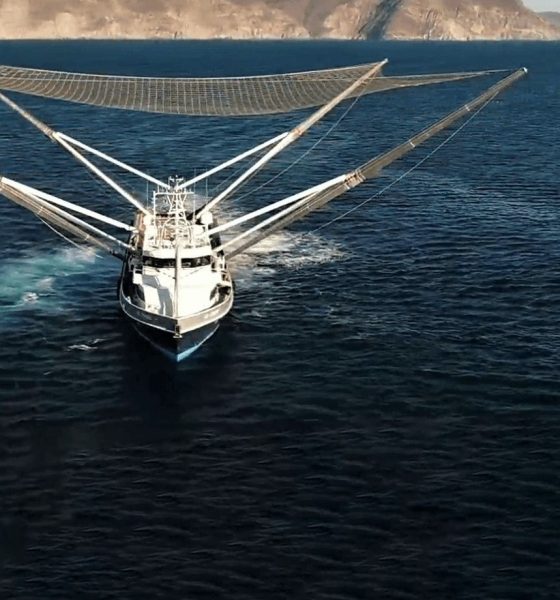
SpaceX
SpaceX CEO Elon Musk hints at new Falcon fairing reuse plan after Mr. Steven misses catch
Ninety minutes after a flawless Falcon 9 launch, landing, and payload deployment, SpaceX CEO Elon Musk took to Twitter to provide an update on the status of Mr. Steven’s latest payload fairing catch attempt.
While sadly unsuccessful on the catch front, Musk noted that both fairing halves successfully performed gentle touchdowns on the ocean surface. Far more importantly, the CEO implied that – counter to past ocean surface recoveries – SpaceX fairing engineers and technicians would instead attempt to dry and clean these particular fairing halves well enough that they can be reused on a future launch.
Falcon fairing halves missed the net, but touched down softly in the water. Mr Steven is picking them up. Plan is to dry them out & launch again. Nothing wrong with a little swim.
— Elon Musk (@elonmusk) December 3, 2018
Intriguingly, this is almost a 180-degree shift in SpaceX’s long-publicized attitude towards fairing recovery, where the implication was that fairing halves would wind up being unreusable if they could not be prevented from landing directly on the ocean surface. To some extent, this was a reasonable argument – thanks to the highly sensitive satellites they enclose, payload fairings must be able to support an internal atmosphere equivalent to a reasonably high-performance clean room while still weighing next to nothing. Falcon 9’s fairing halves weigh approximately 800 kg apiece and are large enough to enclose an entire school bus with plenty of room to spare.
However, this narrative has not exactly been mirrored by prospective competitors, especially international technology manufacturer RUAG, which produces payload fairings and other composite assemblies for both ULA (United Launch Alliance) and Arianespace, SpaceX’s only serious commercial competitors. In a study released earlier this year, a RUAG-funded cost-benefit analysis concluded that the simplest, cheapest, and easiest route to fairing reuse would be simply finding ways to effectively waterproof and clean them after soft ocean landings.
- A RUAG study concluded that waterproofing and cleaning fairings was the best possible route to reuse. (RUAG)
- Close. (SpaceX)
- Hans Koenigsmann was extremely excited about the condition of this particular fairing half, and included this photo in his IAC 2018 keynote. (SpaceX)
In a very literal sense, SpaceX has solved the hardest part of fairing recovery, essentially recovering fairing halves at all without catastrophic or irreparable structural damage in the process of reentering and landing. SpaceX already has a veritable fleet of soiled but wholly intact Falcon fairings, recovery by simply lifting them off the ocean surface after a gentle landing beneath each half’s guided parafoil. Much to its engineers’ chagrin, what SpaceX has yet to solve is the presumably extraordinarily challenging problem of guiding those parasailing fairings with extreme accuracy into Mr. Steven’s net, essentially the bullseye to end all bullseyes.
While it would be both extremely exciting to see Mr. Steven’s visually and technically fascinating net assembly be put to good use and equally disappointing to see his capabilities no longer be needed, Musk’s comment after today’s launch as nothing short of a complete change in his attitude towards fairing recovery, suggesting that SpaceX’s engineers have been working on waterproofing and thorough cleaning as a backup to Mr. Steven’s admittedly Rube Goldberg-esque fairing recovery mechanism.
Mr. Steven is stationed in the Pacific, as SpaceX will attempt to catch and recover the fairing this mission. pic.twitter.com/A7aBSJoFfc
— SpaceX (@SpaceX) December 3, 2018
Regardless of the avenue SpaceX takes, a reusable fairing is a still a reusable fairing, regardless of the gritty details of how that reusability is achieved. As Musk once rather hilariously noted, payload fairings are akin to a pallet of $5M plummeting through the air, a pallet that SpaceX would certainly like to recover. Perhaps, rather than catching that pallet of cash in a net, SpaceX can instead waterproof the bills and pick them up.
For prompt updates, on-the-ground perspectives, and unique glimpses of SpaceX’s rocket recovery fleet check out our brand new LaunchPad and LandingZone newsletters!

Elon Musk
SpaceX to launch Starlink V2 satellites on Starship starting 2027
The update was shared by SpaceX President Gwynne Shotwell and Starlink Vice President Mike Nicolls.
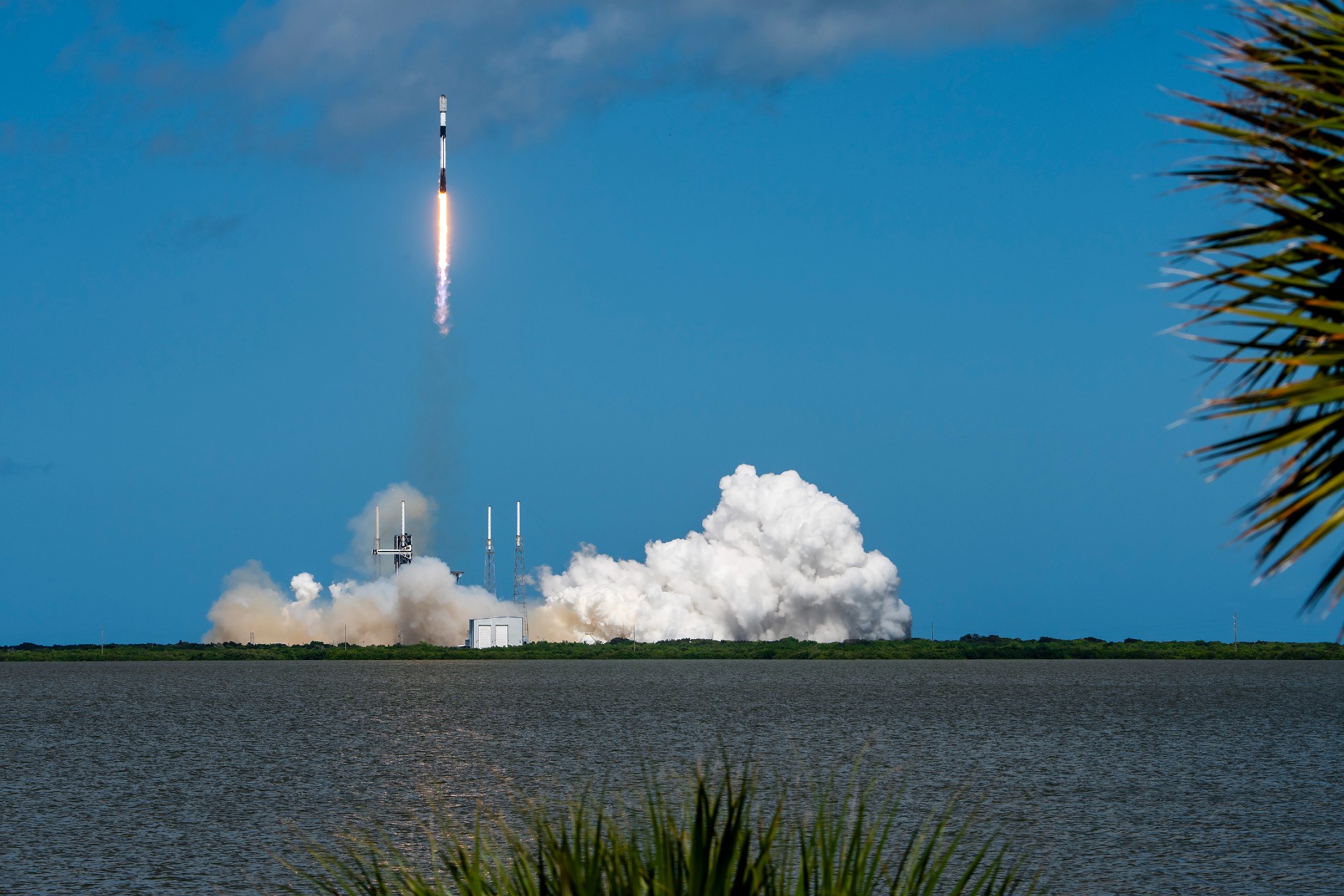
SpaceX is looking to start launching its next-generation Starlink V2 satellites in mid-2027 using Starship.
The update was shared by SpaceX President Gwynne Shotwell and Starlink Vice President Mike Nicolls during remarks at Mobile World Congress (MWC) in Barcelona, Spain.
“With Starship, we’ll be able to deploy the constellation very quickly,” Nicolls stated. “Our goal is to deploy a constellation capable of providing global and contiguous coverage within six months, and that’s roughly 1,200 satellites.”
Nicolls added that once Starship is operational, it will be capable of launching approximately 50 of the larger, more powerful Starlink satellites at a time, as noted in a Bloomberg News report.
The initial deployment of roughly 1,200 next-generation satellites is intended to establish global and contiguous coverage. After that phase, SpaceX plans to continue expanding the system to reach “truly global coverage, including the polar regions,” Nicolls said.
Currently, all Starlink satellites are launched on SpaceX’s Falcon 9 rocket. The next-generation fleet will rely on Starship, which remains in development following a series of test flights in 2025. SpaceX is targeting its next Starship test flight, featuring an upgraded version of the rocket, as soon as this month.
Starlink is currently the largest satellite network in orbit, with nearly 10,000 satellites deployed. Bloomberg Intelligence estimates the business could generate approximately $9 billion in revenue for SpaceX in 2026.
Nicolls also confirmed that SpaceX is rebranding its direct-to-cell service as Starlink Mobile.
The service currently operates with 650 satellites capable of connecting directly to smartphones and has approximately 10 million monthly active users. SpaceX expects that figure to exceed 25 million monthly active users by the end of 2026.
Elon Musk
Starlink V2 to bring satellite-to-phone service to Deutsche Telekom in Europe
Starlink stated that the system is designed to deliver 5G speeds directly to compatible smartphones in remote areas.
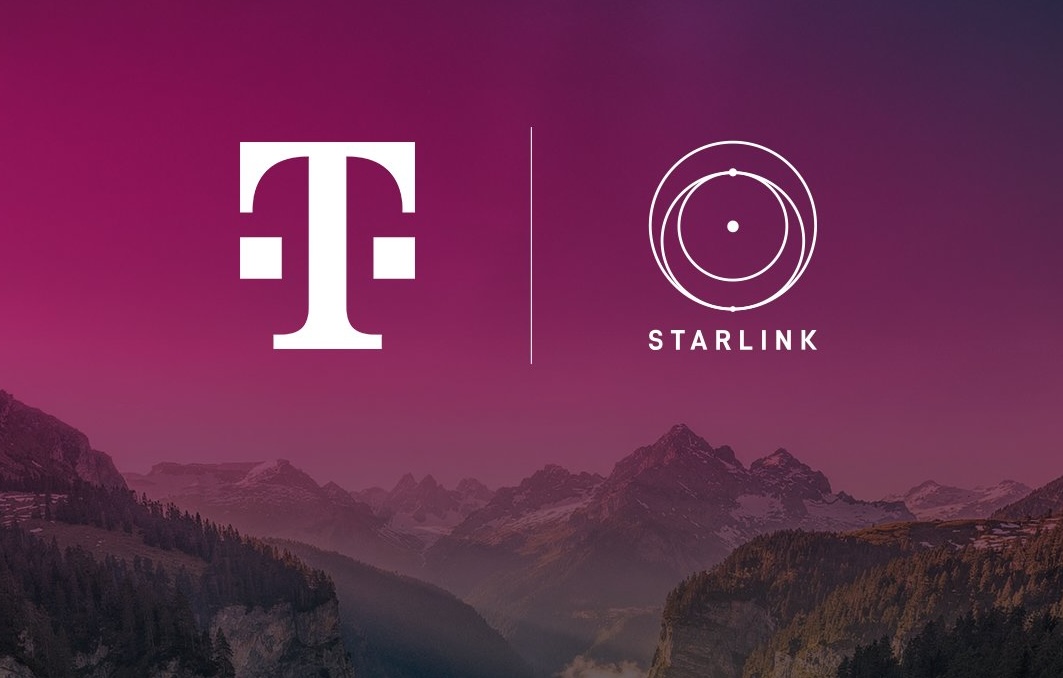
Starlink is partnering with Deutsche Telekom to roll out satellite-to-mobile connectivity across Europe, extending coverage to more than 140 million subscribers across 10 countries.
The service, planned for launch in 2028 in several Telekom markets, including Germany, will use Starlink’s next-generation V2 satellites and Mobile Satellite Service (MSS) spectrum to enable direct-to-device connectivity.
In a post on X, the official Starlink account stated that the agreement will be the first in Europe to deploy its V2 next-generation satellite-to-mobile technology using new MSS spectrum. The company added that the system is designed to deliver 5G speeds directly to compatible smartphones in remote areas.
Abdu Mudesir, Board Member for Product and Technology at Deutsche Telekom, shared his excitement for the partnership in a press release. “We provide our customers with the best mobile network. And we continue to invest heavily in expanding our infrastructure. At the same time, there are regions where expansion is especially complex due to topographical conditions or official constraints,” he said.
“We want to ensure reliable connectivity for our customers in those areas as well. That is why we are strategically complementing our network with satellite-to-mobile connectivity. For us, it is clear: connectivity creates security and trust. And we deliver. Everywhere.”
Under the partnership, compatible smartphones will automatically switch to Starlink’s satellite network when terrestrial coverage is unavailable, enabling access to data, voice, video, and messaging services.
Telekom reports 5G geographic coverage approaching 90% in Germany, with LTE exceeding 92% and voice coverage reaching up to 99%. Starlink’s satellite layer is intended to extend connectivity beyond those terrestrial limits, particularly in topographically challenging or infrastructure-constrained areas.
Stephanie Bednarek, VP of Starlink Sales, also shared her thoughts on the partnership. “We’re so pleased to bring reliable satellite-to-mobile connectivity to millions of people across 10 countries in partnership with Deutsche Telekom. This agreement will be the first-of-its-kind in Europe to launch Starlink’s V2 next-generation technology that will expand on data, voice and messaging by providing broadband directly to mobile phones,” she said.
Starlink’s V2 constellation is designed to expand bandwidth and capacity compared to its predecessor. If implemented as outlined, the 2028 launch would mark one of the first large-scale European deployments of integrated satellite-to-phone connectivity by a major telecom operator.
Elon Musk
SpaceX pursues 5G-level connectivity with Starlink Mobile V2 expansion
SpaceX noted that the upcoming Starlink V2 satellites will deliver up to 100 times the data density of the current first-generation system.

SpaceX has previewed a major upgrade to Starlink Mobile, outlining next-generation satellites that aim to deliver significantly higher capacity and full 5G-level connectivity directly to mobile phones.
The update comes as Starlink rebrands its Direct-to-Cell service to Starlink Mobile, positioning the platform as a scalable satellite-to-mobile solution that’s integrated with global telecom partners.
SpaceX noted that the upcoming Starlink V2 satellites will deliver up to 100 times the data density of the current first-generation system. The company also noted that the new V2 satellites are designed to provide significantly higher throughput capability compared to its current iteration.
“The next generation of Starlink Mobile satellites – V2 – will deliver full cellular coverage to places never thought possible via the highest performing satellite-to-mobile network ever built.
“Driven by custom SpaceX-designed silicon and phased array antennas, the satellites will support thousands of spatial beams and higher bandwidth capability, enabling around 20x the throughput capability as compared to a first-generation satellite,” SpaceX wrote in its official Starlink Mobile page.
Thanks to the higher bandwidth of Starlink Mobile, users should be able to stream, browse the internet, use high-speed apps, and enjoy voice services comparable to terrestrial cellular networks.
In most environments, Starlink says the upgraded system will enable full 5G cellular connectivity with a user experience similar to existing ground-based networks.
The satellites function as “cell towers in space,” using advanced phased-array antennas and laser interlinks to integrate with terrestrial infrastructure in a roaming-like architecture.
“Starlink Mobile works with existing LTE phones wherever you can see the sky. The satellites have an antenna that acts like a cellphone tower in space, the most advanced phased array antennas in the world that connect seamlessly over lasers to any point in the globe, allowing network integration similar to a standard roaming partner,” SpaceX wrote.
Starlink Mobile currently operates with approximately 650 satellites in low-Earth orbit and is active across more than 32 countries, representing over 1.7 billion people through partnerships with mobile network operators. Starlink Mobile’s current partnerships span North America, Europe, Asia, Africa, and Oceania, allowing reciprocal access across participating nations.
